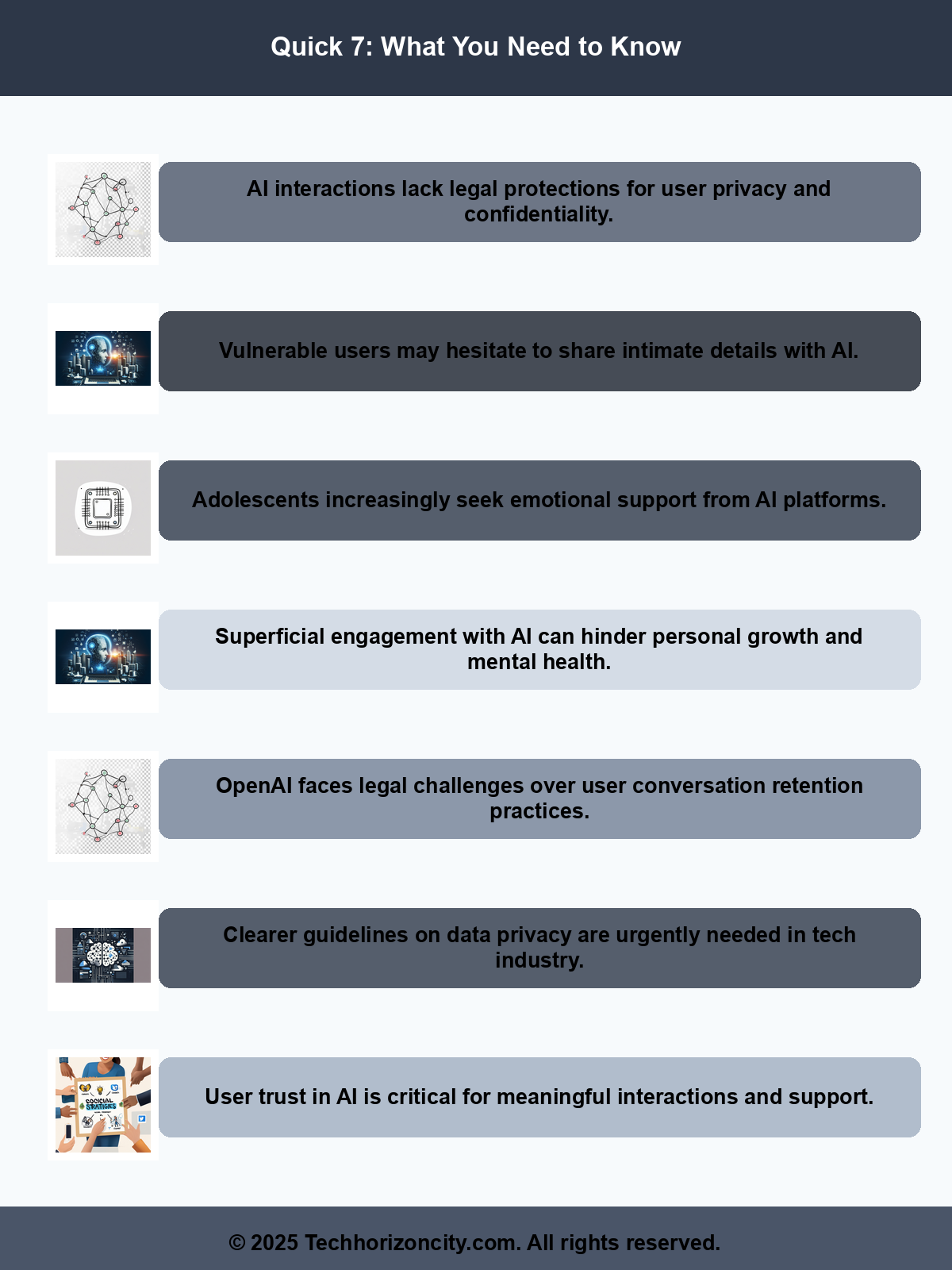Executive Summary
As artificial intelligence increasingly becomes a part of our daily lives, the implications of user privacy, particularly in sensitive dialogues such as therapy, are coming under scrutiny. Sam Altman, CEO of OpenAI, has raised alarm over the lack of legal protections surrounding conversations with AI systems like ChatGPT. In a recent podcast appearance, he highlighted the precarious position of users who seek personal support through these platforms, especially young individuals. This blog post delves into the current landscape of AI privacy, the legal challenges OpenAI faces, and what this means for future interactions between users and AI.

Background Context
The advent of AI technologies has transformed the way we interact with machines. From automating mundane tasks to engaging in complex conversations, AI has become a go-to solution for many. However, as users increasingly turn to AI for guidance on personal issues, the nuances of privacy and confidentiality become critical. Unlike traditional therapy, where conversations are protected by legal confidentiality, interactions with AI lack such safeguards. This raises significant questions about user trust and the ethical responsibilities of tech companies.
For technical resources and innovative solutions, please visit EchoesOfCreationUS for specialized technical resources.
Sam Altman’s discussion on “This Past Weekend w/ Theo Von” sheds light on the burgeoning relationship between users and AI chatbots. He pointed out that many individuals, particularly adolescents, are using these platforms not just for casual interactions but for emotional support and advice on personal struggles. The absence of legal frameworks protecting these exchanges presents a worrisome gap in privacy that users may not be aware of.
Analysis of Implications
The implications of this lack of privacy are manifold. First and foremost, it places a significant burden on users who may feel vulnerable when sharing intimate details with an AI. The potential for their conversations to be accessed or scrutinized by external parties, especially in legal contexts, could deter many from engaging deeply with these systems. This could lead to a superficial use of AI tools, whereby users hold back on sharing critical information that could otherwise benefit their personal growth and mental health.
Discover exclusive offers and premium content at Active Living Offers – your gateway to enhanced productivity and lifestyle solutions.
Moreover, OpenAI’s ongoing legal battle with The New York Times regarding the retention of user conversations highlights the tension between innovation and regulation. Altman’s assertion that existing orders could be overreaching speaks to a wider concern within the tech industry: the need for clearer guidelines on data privacy. The outcome of this litigation may set a precedent that could dictate how similar companies manage user data in the future.
Industry Impact Assessment
The ramifications of these privacy issues extend beyond OpenAI and its products. As AI technology continues to permeate various sectors, from healthcare to finance, the demand for robust privacy legislation becomes increasingly urgent. Companies are now faced with the dual challenge of innovating responsibly while ensuring compliance with evolving regulatory landscapes.
Investors and stakeholders in the tech industry are also keeping a keen eye on these developments. Events like TechCrunch Disrupt 2025, where major players such as Netflix and Sequoia Capital converge, will likely feature discussions around ethical AI and user privacy. The industry’s reaction to these challenges will shape not only public perception but also investment decisions, ultimately influencing the direction of AI development.
Future Outlook
Looking ahead, it’s critical for tech companies to proactively address privacy concerns to maintain user trust. As more individuals seek solace in AI interactions, establishing clear guidelines around data handling and user privacy will be paramount. OpenAI’s response to the current legal challenges may serve as a litmus test for the industry regarding how seriously companies take user confidentiality.
Furthermore, there is potential for the development of new frameworks that could enable AI to operate within guidelines similar to those governing traditional therapy. This could involve creating AI systems that not only respect user privacy but also communicate openly about data usage policies. Such innovations would foster a stronger bond between users and technology, ultimately enhancing the effectiveness of AI as a supportive tool.
Conclusion with Key Takeaways
As we traverse the complex landscape of AI and user privacy, several key takeaways emerge:
- User Awareness is Critical: Users must understand the implications of interacting with AI, especially in sensitive contexts.
- Legal Protections are Needed: The tech industry must advocate for clear legislation that ensures user privacy in AI interactions.
- Trust is Fundamental: Without trust, users may shy away from leveraging AI for personal support, stifling the technology’s potential benefits.
- Industry Accountability is Essential: Companies must take responsibility for user data and be transparent about their practices.
Ultimately, the future of AI in personal contexts hinges on the delicate balance between innovation and ethical responsibility. How stakeholders navigate these waters will undoubtedly shape the landscape of technology for years to come.
Disclaimer: This article was independently created based on publicly available information and industry analysis.
